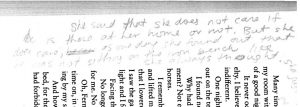The Shrouded Woman – no ragrets?
‘The Shrouded Woman’ by María Luisa Bombal.
There is a theory that says your brain is still active for 7 minutes after you die. I think about it a lot, I was reminded of it reading this novel as well. During that seven minutes, I like to think every person would just think back on their lives and evaluate the ups and downs. As much as the book is a work of fiction with a dead woman literally seeing her surroundings and recounting her life, none of us would ever know what really happens after death. Perhaps we drown into eternal darkness, or we turn into a ghost and be able to see everything in third perspective, or perhaps we pass the bridge between life and death like the book described.
“Oh! to cross that bridge and to stretch out full length on the snow on the other side, so that seconds, minutes, hours, days and years of silence might fall and fall on her face, on her limbs, on her tired heart!”
I guess this is why reading fiction about death, and hence life is interesting, because we have not yet solved the great enigma that is death, because we can let our minds wander with creativity when writing about it! Anyways, this novel is, of the three books we have read so far, my favorite, partly because it was easier to read with shorter sentences, or because it was from a woman’s perspective which I could relate with while reading it. Ana Maria, on her death bed, starts reminiscing about her life filled with pain, regrets, jealousy as well as love (painfully so). It is implied that her life was not the greatest to look back on, especially with the regretful decisions of staying with the loathsome husband Antonio, or less significant ones like not forgiving a once dear friend Sofia after her betrayal. It makes me wonder how much of our lives would we regret after dying, after not being able to fix anything. Ana Maria seems to be excited for the death awaiting her, for her ‘second’ death after a life lived like the dead. A ‘death of the dead’. Her accepting her death without protests, eager to finally rest her tired mind in peace seemed sad yet beautiful to me – it was a bittersweet ending. What was more tragic to me was the reality of women stuck in unhappy marriages, not knowing whether her feelings are coming from love or hatred. The women in the novel were painted with such negative undertones in my opinion; of jealousy, betrayal, and pain. Also, one part that felt odd and a bit funny was how Maria Griselda was so gorgeous that it brought suffering wherever she was, to herself and to others. It is ironic to think that this beauty would bring such sorrow.
I read the book from the PDF that was on the website, which was a scanned version of the book already read and annotated. It was really fun to read the little notes with the texts, and some of them even helped me understand parts where I had challenges comprehending.

Another thing I want to mention is I was listening to random movie soundtracks while reading the ending, and a weird coincidence happened! Right during the priest’s speech of how Ana Maria would think heaven is like the Garden of Eden as a child, this soundtrack of the movie Minari, ‘Garden of Eden’ by Emile Mosseri was playing in the background!
My question is: If you had a chance to review your life on your death bed, would you think more about the regrets or the joyful moments?
